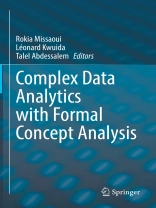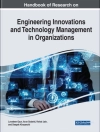FCA is an important formalism that is associated with a variety of research areas such as lattice theory, knowledge representation, data mining, machine learning, and semantic Web. It is successfully exploited in an increasing number of application domains such as software engineering, information retrieval, social network analysis, and bioinformatics. Its mathematical power comes from its concept lattice formalization in which each element in the lattice captures a formal concept while the whole structure represents a conceptual hierarchy that offers browsing, clustering and association rule mining.
Complex data analytics refers to advanced methods and tools for mining and analyzing data with complex structures such as XML/Json data, text and image data, multidimensional data, graphs, sequences and streaming data. It also covers visualization mechanisms used to highlight the discovered knowledge.
This edited book examines a set of important and relevant research directions in complex data management, and updates the contribution of the FCA community in analyzing complex and large data such as knowledge graphs and interlinked contexts. For example, Formal Concept Analysis and some of its extensions are exploited, revisited and coupled with recent processing parallel and distributed paradigms to maximize the benefits in analyzing large data.
Содержание
Chapter. 1.- Formal Concept Analysis and Extensions for Complex Data Analytics.- Chapter. 2.- Conceptual Navigation in Large Knowledge Graphs.- Chapter. 3.- FCA2VEC: Embedding Techniques for Formal Concept Analysis.- Chapter. 4.- Analysis of Complex and Heterogeneous Data using FCA and Monadic Predicates.- Chapter. 5.- Dealing with Large Volumes of Complex Relational Data using RCA.- Chapter. 6.- Computing Dependencies using FCA.- Chapter. 7.- Leveraging Closed Patterns and Formal Concept Analysis for Enhanced Microblogs Retrieval.- Chapter. 8.- Scalable Visual Analytics in FCA.- Chapter. 9.- Formal methods in FCA and Big Data.- Chapter. 10.- Towards Distributivity in FCA for Phylogenetic Data.- Chapter. 11.- Triclustering in Big Data Setting.
Об авторе
Rokia Missaoui obtained her Ph.D. in Computer Science from the University of Montreal in 1988 and has been a university professor in Canada for more than thirty years. She is currently a full professor in the Department of Computer Science and Engineering at the University of Quebec in Outaouais (UQO). Before joining UQO in 2002, she was a professor at the University of Quebec in Montreal (UQAM) for fifteen years. She leads the LARIM laboratory at UQO and is a member of the LATECE laboratory at UQAM. Since the beginning of her career, she has been involved in several research projects funded by granting agencies and industrial partners. Her research interests and teaching activities are currently focused on advanced databases, data mining and warehousing, machine learning, social network analysis and big data analytics.
Léonard Kwuida graduated in mathematics at Université de Yaoundé I. He hold a Ph D in algebra and logic from TU Dresden. He currently works at the Department of Business, Bern University of Applied Sciences, where he teaches mathematics and statistics. He does research in Formal Concept Analysis and related algebraic structures. He has (co-)authored more than thirty papers published in peer-reviewed journals, conferences and workshops proceedings. Dr. Kwuida has co-edited four proceedings and published one book. He also serves in the Program Committee of major conferences in FCA.
Talel Abdessalem is a Professor at Télécom Paris (Institut Polytechnique de Paris). He held the Big Data and Market Insights Chair at Télécom Paris Tech from 2013 to 2017. He is heading the Information and Communication (LTCI) research center since 2017 and Dean of Research at Télécom Paris since 2018. His main research achievements are on version control, change detection and querying of XML documents, information extraction from the structured web, and social networks analysis. His current research interests are in recommender systems and predictive analytics. He participated in several national and European research projects. He co-supervised a dozen of Ph. D. students. He received a Ph. D. in Computer Science from the University Paris-Dauphine and a Habilitation degree (HDR) from the University Pierre & Marie Curie. He spent two years as an assistant professor at the University Paris-Dauphine (PSL), before joining Telecom Paris (formerly ENST) in 1998.












